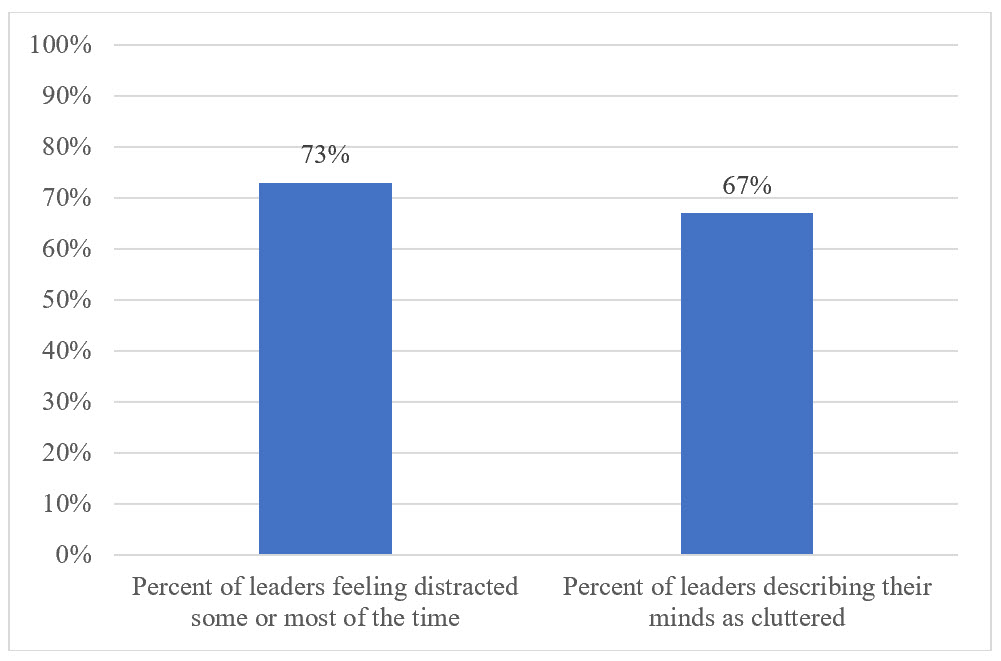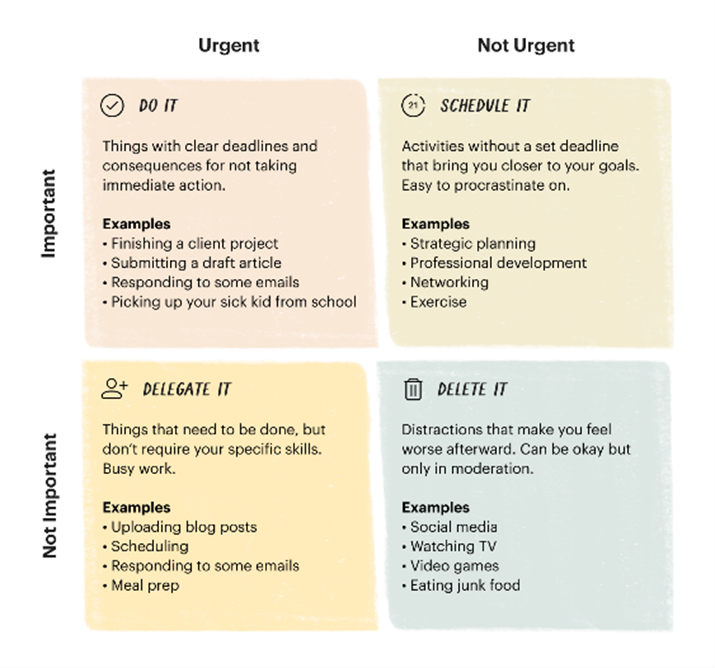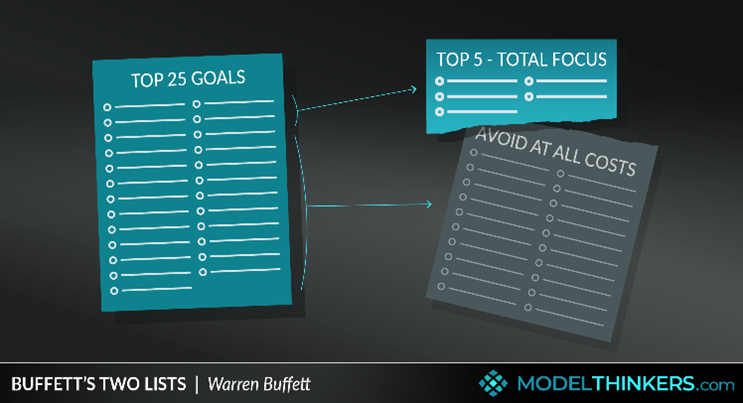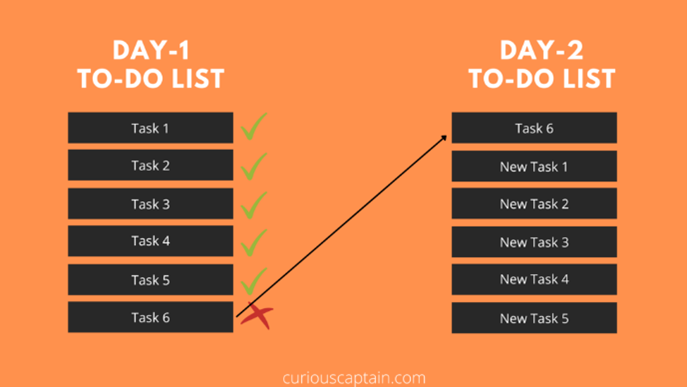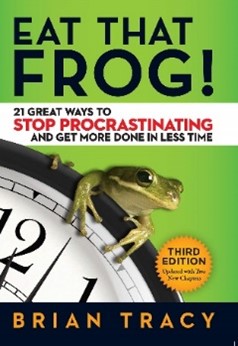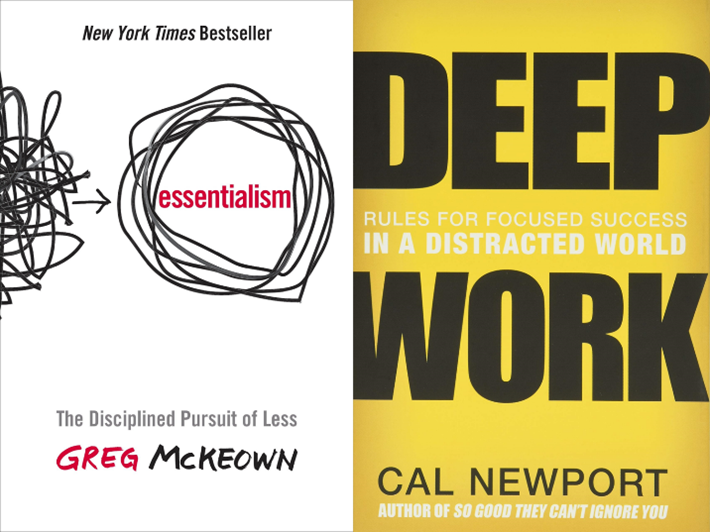Article Summary:
These days, we’re bombarded with digital distractions, and it’s detracting from our ability to get things done, our leadership effectiveness, and our quality of life. This article notes 15 of the most important benefits of focus and provides 24 actionable strategies for developing and maintaining our focus.
“Things which matter most must never be at the mercy of things which matter least.”
-Johann Wolfgang von Goethe
These days it feels like the world is dead-set against our having focus. We’re bombarded with digital distractions. There are near-constant requests for our attention, many driven by algorithms that have cracked the code on hijacking it.
So we struggle with overload and overwhelm. Our concentration is fragmented. We check our phones constantly.
In such a hostile environment, it’s exceedingly difficult for us to focus. But that’s a disaster, not only for our work productivity but also for our quality of life.
Focus is a complex cognitive phenomenon.* For our purposes here, it entails two main abilities:
- our ability to concentrate on something in front of us (such as an article or a person talking), channeling our full attention to it without distraction
- our ability to concentrate attention or effort on the most pressing needs out of an array of possibilities (such as our top priorities)
Think of a laser. Is our effort focused like a laser on what truly matters, or getting dispersed into a random assortment of tasks?
In today’s world of digital distraction, both levels of focus are in jeopardy. We see it in the data.
Unfocused Leaders
According to a survey of more than 35,000 leaders from thousands of companies across 100-plus countries, 73% of them reported feeling distracted from their current task some or most of the time. What’s more, 67% of leaders described their minds as cluttered.
The biggest sources of distraction for these leaders were:
- demands of other people (26%)
- competing priorities (25%)
- general distractions (13%)
- too big of a workload (12%)
Nearly all the leaders surveyed (96%) indicated that enhanced focus would be valuable or extremely valuable to them. The researchers concluded:
“The ability to apply a calm, clear focus to the right tasks—at the right time, in the right way—is the key to exceptional results…. we have observed a direct correlation between a person’s focus level and their career advancement.”
-Rasmus Hougaard and Jacqueline Carter**
According to research from Dr. Glenn Wilson at London’s Institute of Psychiatry, we pay a high price for the persistent interruptions and distractions we encounter. Here’s a summary of the findings written up in The Guardian:
“Those distracted by emails and phone calls saw a ten-point fall in their IQ, twice that found in studies on the impact of smoking marijuana. More than half of the 1,100 participants said they always responded to an email immediately or as soon as possible, while 21% admitted they would interrupt a meeting to do so. Constant interruptions can have the same effect as the loss of a night’s sleep.”
(Source: Harriet Griffey, “The Lost Art of Concentration,” The Guardian, October 14, 2018.)
In our age of skimming, scrolling, and swiping, some of us may be losing the ability to read books or study articles for more than a few minutes. Isn’t technology supposed to enrich our lives, not degrade them? We must avoid the sorry fate of becoming slaves to our machines.
“A primary task of leadership is to direct attention. To do so, leaders must learn to focus their own attention….
Attention is the basis of the most essential of leadership skills—emotional, organizational, and strategic intelligence.
And never has it been under greater assault….”
-Daniel Goleman

Quality of Life Assessment
Evaluate your quality of life in ten key areas by taking our assessment. Discover your strongest areas, and the areas that need work, then act accordingly.
The Problem with Lack of Focus
We pay a price for our diminished ability to concentrate on the things in front of us and to concentrate effort on our most pressing needs.
When we’re not focused, we’re:
- reading something over and over but not absorbing it
- listening to people but having our mind wander so we don’t take their words in
- zoning out in meetings or lectures
- more likely to fall behind, causing stress and anxiety
- busy all the time—busy, busy, busy
- stressed, with stress hormones like cortisol overwhelming calming and feel-good hormones like serotonin and dopamine
- dealing with repetitive, intrusive thoughts that we struggle to let go
- tired and depleted
- overworked and overwhelmed
- not making significant progress on our most important tasks
- jumping from task to task, flying around frenetically
- beholden to working on things that are other people’s priorities, whatever is easiest in the moment, or whatever appears before us as we check emails and respond
- constantly putting out fires (which is exhausting for us and chaotic and frustrating for those around us)
- frequently switching between tasks (a big problem, since our brains can’t transition seamlessly across tasks; there’s a major delay and a cost in terms of our energy)
- working on things that should be done by others or that should be automated
- doing things that shouldn’t be done at all (the worst of all)
The Benefits of Focus
By contrast, there are many benefits when we cultivate our ability to focus and prioritize. Here are the most important benefits:
- better work quality
- higher productivity
- better decision-making
- enhanced ability to pursue goals intensely
- improved cognitive flexibility, allowing us to resist distractions and shift our focus away from unproductive things
- greater mental efficiency, since we’re not wasting valuable mental energy on distractions
- better time management
- full presence in the moment
- better capacity for learning
- enhanced creativity
- less stress
- help with managing harmful or unproductive thoughts and emotions
- improved ability to develop strong social relationships and empathize with others (by focusing on their point of view as well as our own)
- enhanced ability to remain calm under pressure and to recover from setbacks
- creation of mental stillness, allowing us to hear our inner voice and pay attention to our gut feelings, which can be critical in wise decision-making

Take the Traps Test
We all fall into traps in life. Sometimes we’re not even aware of it, and we can’t get out of traps we don’t know we’re in. Evaluate yourself with our Traps Test.
How to Develop Our Focus: Strategies and Approaches
So how do we develop our focus? Here are 24 actionable strategies and approaches:
- Observe our daily rhythms, including best and worst times for focused work as well as energy levels at different times and on different tasks. Then design our work and schedule to capture our greatest attention, energy, and focus.
- Take regular breaks, recognizing that our brains can’t focus all the time and that we need to toggle between focus and rest. (When we do so, we’re able to focus much better when we return from rest, according to the research.)
- Practice self-care, including good sleep habits (regular bedtimes, caffeine and device curfews, etc.), eating and hydration habits, and exercise habits to reduce stress and produce energy.
- Minimize interruptions and eliminate distractions. (Tip: turn off smartphone notifications and place the device outside the room when working.)
- Develop simple rules to maximize time in deep work (e.g., never check email before noon or another time that works for you).
- Engage our senses when we’re doing deep work (e.g., lighting a scented candle, playing classical music in the background, or working in a room with a beautiful design or view).
- Focus on one task at a time and avoid frequent task-switching, since we waste time regrouping and trying to recover our original flow when we switch tasks.
- Design our work for “flow.”
- Practice doing things that require concentration, such as reading books or playing games that requires mental focus.
- Engage in deep breathing and practice meditation.
- Reduce anxiety, stress, and negative self-talk.
- Develop clarity on what’s most important.
- Determine which tasks will make the highest possible contribution toward our most important aims.
- Clear the decks so we can focus on our most essential task for extended periods.
- Reduce or eliminate non-essential tasks. (Consider using a “stop doing list” or a “drop list.”)
- Schedule the most important tasks and impose deadlines on them. (Tip: be generous in the amount of time given for completion, as we tend to underestimate the time it will take, causing unhelpful stress.)
- Learn how to say “no” more often and more easily, especially to things that don’t fit with our top priorities.***
- Avoid “sunk cost bias” by asking if we weren’t invested in this already, how much would we invest in it now (with time, resources, etc.)—and considering what else could be done with our time or money.
- Get better at cutting our losses, recognizing that it’s a necessary and important part of life
- Systematically measure our progress on our most important tasks. (Getting feedback on progress helps maintain our attention.)
- Stop focusing so much on results and focus more on deep engagement with the process of doing things that matter (e.g., less focus on our target weight and more focus on the strategies we can learn for healthy eating, sleeping, moving, etc.).
- Experiment with different schedules that help us focus better (e.g., themed days, such as a Monday planning day, Tuesday prospecting day, Wednesday writing day, etc.). Or half-days.
- Be more disciplined in committing to one thing at a time, as opposed to having to divide our attention across multiple things.
- Make a “Done for the Day” list each morning—a list of what would constitute essential progress and that’s reasonable for a single day. (Source: Greg McKeown in Effortless.)

Personal Values Exercise
Complete this exercise to identify your personal values. It will help you develop self-awareness, including clarity about what’s most important to you in life and work, and serve as a safe harbor for you to return to when things are tough.
Tools that Can Help with Focus
Beyond the strategies and approaches noted above, there are also many tools and frameworks that can help with focus and prioritization. Below are several of them:
1. Eisenhower Decision Matrix (a.k.a., Urgent-Important Matrix): distinguish between tasks that are urgent (time-sensitive, demanding immediate attention) and important (contributing to our long-term purpose and vision), using a simple matrix.
2. Warren Buffett’s Two Lists: write down our top 25 goals, then circle our five highest priorities from that larger list, and then only focus on the top five—“avoiding at all costs,” as Buffett says, working on the other 20.
3. Ivy Lee Method: give ourselves no more than six important tasks per day, listed from most important to least important. Then address them in order of priority, and without moving to the next task until the current one is complete.
4. Brian Tracy’s “Eat the Frog” method: identify one challenging and important task (the metaphorical frog) and complete it first thing in the morning. The logic:
“The hardest part of any important task is getting started on it in the first place.
Once you actually begin work on a valuable task, you seem to be naturally motivated to continue….
The most valuable tasks you can do each day are often the hardest and most complex.
But the payoff and rewards for completing these tasks efficiently can be tremendous.”
-Brian Tracy
Related Books
Since so many of us struggle with the challenge of staying focused in our world of constant distractions, it’s good that we have many excellent resources. Below are two helpful books that address the root causes of the problems, with select quotations from the books as well:
Essentialism (by Gregory McKeown):
- “Only once you give yourself permission to stop trying to do it all, to stop saying yes to everyone, can you make your highest contribution towards the things that really matter.”
- “The way of the Essentialist is the relentless pursuit of less but better.”
- “Essentialism is not about how to get more things done; it’s about how to get the right things done. It doesn’t mean just doing less for the sake of less either.”
- “Remember that if you don’t prioritize your life someone else will.”
- “Sometimes what you don’t do is just as important as what you do.”
- “The way of the Essentialist means living by design, not by default. Instead of making choices reactively, the Essentialist deliberately distinguishes the vital few from the trivial many, eliminates the nonessentials, and then removes obstacles so the essential things have clear, smooth passage. In other words, Essentialism is a disciplined, systematic approach for determining where our highest point of contribution lies, then making execution of those things almost effortless.” -Gregory McKeown, Essentialism: The Disciplined Pursuit of Less
Deep Work (by Cal Newport):
- “The ability to perform deep work is becoming increasingly rare at exactly the same time it is becoming increasingly valuable in our economy. The few who cultivate this skill and make it the core of their working life will thrive.”
- “To produce at your peak level you need to work for extended periods with full concentration on a single task free from distraction. Put another way, the type of work that optimizes your performance is deep work.”
- “Less mental clutter means more mental resources available for deep thinking.”
- “Efforts to deepen your focus will struggle if you don’t simultaneously wean your mind from a dependence on distraction.”
- “What we choose to focus on and what we choose to ignore—plays in defining the quality of our life.”
- “Who you are, what you think, feel, and do, what you love—is the sum of what you focus on.”
- “To build your working life around the experience of flow produced by deep work is a proven path to deep satisfaction.” -Cal Newport, Deep Work: Rules for Focused Success in a Distracted World
Reflection Questions
- Are you struggling with concentrating on the things in front of you without distraction?
- Are you struggling with concentrating your effort on your most important tasks?
- Which focus and prioritization strategies and tools work best for you?
- Which new ones will you try, starting today?
Tools for You
- Traps Test (Common Traps of Living) to help you identify what’s getting in the way of your happiness and quality of life
- Quality of Life Assessment so you can discover your strongest areas and the areas that need work, then act accordingly.
- Personal Values Exercise to help you clarify what’s most important to you
Related Articles
Postscript: Inspirations on Focus and Prioritization
- “If there is any one secret of effectiveness, it is concentration. Effective executives do first things first and they do one thing at a time.” -Peter Drucker, author on management and innovation
- “Concentrate all your thoughts upon the work at hand. The sun’s rays do not burn until brought to a focus.” -Alexander Graham Bell
- “The wisdom of life consists in the elimination of non-essentials.” -Lin Yutang
- “Learn to master your attention, and you will be in command of where you, and your organization, focus.” -Daniel Goleman
- “Most people have no idea of the giant capacity we can immediately command when we focus all of our resources on mastering a single area of our lives.” -Tony Robbins
- “I don’t care how much power, brilliance or energy you have, if you don’t harness it and focus it on a specific target, and hold it there you’re never going to accomplish as much as your ability warrants.” -Zig Ziglar
- “If you don’t guard your time, people will steal it from you.” -Pedro Sorrentino, investor
- “People think focus means saying yes to the thing you’ve got to focus on. But that’s not what it means at all. It means saying no to the hundred other good ideas that there are. You have to pick carefully.” -Steve Jobs
- “Every time we say yes to a request, we are also saying no to anything else we might accomplish with the time.” -Tim Harford, economist
- “There is nothing so useless as doing efficiently that which should not be done at all.” -Peter Drucker
- “Without focus, you can never achieve anything.” -Eric Phillips
- “What you stay focused on will grow.” -Roy T. Bennett
- “Where your attention goes, your time goes.” -Idowu Koyenikan
- “Beware of the barrenness of a busy life!” -Christian Missionary Review, 1902
- “Half the troubles of this life can be traced to saying yes too quickly and not saying no soon enough.” -Josh Billings
- “Focus is not a zero-sum game. Focus can be trained and planned. And with a bit of effort, your focus can be sustained throughout the day.” -Rasmus Hougaard and Jacqueline Carter
- “Focused leaders can command the full range of their own attention: They are in touch with their inner feelings, they can control their impulses, they are aware of how others see them, they understand what others need from them, they can weed out distractions and also allow their minds to roam widely, free of preconceptions.” -Daniel Goleman
- “My role does not allow for a lack of focus. I can’t afford to be distracted. I must be on point. I have trained my focus while at work for 15 years, moment-to-moment. I feel the brain is like a muscle, and I exercise it all the time.” -Jean-Francois van Boxmeer, CEO of Heineken
Notes:
* Mental processes related to focus include:
- cognitive control (placing our attention where we want it and keeping it there despite distractions or temptations to focus elsewhere)
- selective attention (focusing on certain stimuli selectively when several occur simultaneously, such as focusing on one person’s voice in a crowded room)
- open awareness (our attention is open and remains aware of everything that’s happening around us, instead of concentrating on one thing)
** Source: Rasmus Hougaard and Jacqueline Carter, “Are You Having Trouble Focusing? These Simple Strategies Will Help,” Harvard Business Blogs, December 26, 2017.
*** McKeown suggests saying “yes” only to the top 10% of opportunities we encounter, in part by using rigorous criteria for giving assent, such as whether the opportunity is exactly what we’re looking for. If it’s not a clear “yes,” it becomes a clear “no.”

Gregg Vanourek’s Newsletter
Join our rapidly growing community. Sign up now and get monthly inspirations (new articles, opportunities, and resources). Welcome!
++++++++++++++++++++++++++++++
Gregg Vanourek is a writer, teacher, TEDx speaker, and coach on personal development and leadership. He is co-author of three books, including LIFE Entrepreneurs: Ordinary People Creating Extraordinary Lives (a manifesto for living with purpose and passion) and Triple Crown Leadership: Building Excellent, Ethical, and Enduring Organizations (a winner of the International Book Awards). Check out his Best Articles or get his monthly newsletter. If you found value in this article, please forward it to a friend. Every little bit helps!


